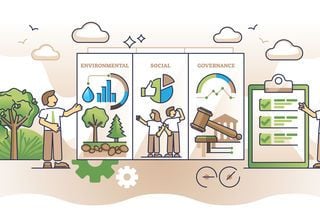Measuring an organisation's social sustainability
How to incorporate the S in ESG reporting: materiality, metrics and creating momentum
Sustainability in Hospitality — Viewpoint by Anke Winchenbach
Organisations should be measuring the holistic well-being of all stakeholders under the Social component of the "ESG" Framework. An organisations stakeholders typically include employees, local communities, customers, and suppliers. Compared to Environmental ('E') metrics, Social ('S') metrics can be challenging to define and measure, but there are several emerging and established indices and tools that organisations can use to assess their Social imapct. Holistic well-being can be measured through six domains, as recommended by the comprehensive "Well-Being Assessment" (WBA) of the Human Flourishing Program, namely: Emotional Health, Physical Health, Meaning and Purpose, Character Strengths, Social Connectedness and Financial Security, developed by the Sustaianbility and Health Initiative for NetPositive Enterprise (SHINE) at Harvard's School of Public Health. The World Health Organisation's definition of health goes beyond mental and physical health to include the wholeness of a person. Social metrics in the EU are being standardized through the EU Social Taxonomy, a potentially new social reporting tool that will allow organisations to report against decent work, adequate living standards and inclusive and sustainable communities and societies. Companies can also report Social Sustainability against universally recognized protocol such as the UN Guiding Principles on Business & Human Rights or UNSDGs (SDG Goal 3: universal well-being), or more specific well-being indices such as the Happy Planet Index, the World Happiness Report, Global Happiness and Well-Being Policy Report, the OECD's Well-being framework or others. For an organization to effectively measure social sustainability and social impact, stakeholders must be engaged and incentivized to provide regular and real input. In additional to a organisation' immediate stakeholders, the "S" in ESG also considers the wider society(s) and political environment(s) in which an organization operates.
The "S" in ESG receives far less attention as social concerns are widely perceived as being harder to define and measure. The dependence on largely qualitative and emotive data maybe a barrier to assessing social sustainability, as opposed to environmental measurements which are typically quantitative and science-based. Effectively measuring social sustainability requires extensive monitoring of people (or groups of people), over time. To measure factors such as 'holistic employee well-being' may not be as straight-forward as measuring air quality, waste volumes, water quality, soil health or creating biodiversity indices, for instance. The lack of standardization for social metrics across organisations and industries makes measuring social sustainability more difficult than environmental, the latter being governed by numerous bodies, protocols and global targets and KPIs for measurement.
Reference:
- https://news.harvard.edu/gazette/story/newsplus/new-paper-develops-a-comprehensive-measure-of-holistic-well-being/
- https://shine.sph.harvard.edu/
- https://www.oecd.org/wise/Measuring-the-Social-Performance-of-Firms-through-the-Lens-of-the-OECD-Well-being-Framework-Policy-Brief-February-2022.pdf?_ga=2.124331850.1903774256.1663676053-1056315040.1663676053
- https://www.thomsonreuters.com/en-us/posts/news-and-media/measuring-social-esg-well-being/

 by
by 

